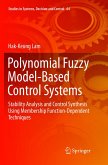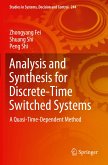This book aims to introduce the state-of-the-art research of stability/performance analysis and optimal synthesis methods for fuzzy-model-based systems. A series of problems are solved with new approaches of design, analysis and synthesis of fuzzy systems, including stabilization control and stability analysis, dynamic output feedback control, fault detection filter design, and reduced-order model approximation. Some efficient techniques, such as Lyapunov stability theory, linear matrix inequality, reciprocally convex approach, and cone complementary linearization method, are utilized in the approaches. This book is a comprehensive reference for researchers and practitioners working on intelligent control, model reduction, and fault detection of fuzzy systems, and is also a useful source of information for senior undergraduates and graduates in these areas. The readers will benefit from some new concepts and methodologies with theoretical and practical significance in system analysis and control synthesis.
"From the mathematical point of view it is worth mentioning that almost all results are presented as Theorems, followed by proofs and illustrative application examples. This aspect emphasizes the pedagogical aspects and qualities of the book. Specialists interested in fuzzy control as a possible option for 'intelligent control' will find in this book a genuine handbook with illustrations. Especially to them ... the book is warmly recommended." (Vladimir Rasvan, zbMATH 1480.93005, 2022)








